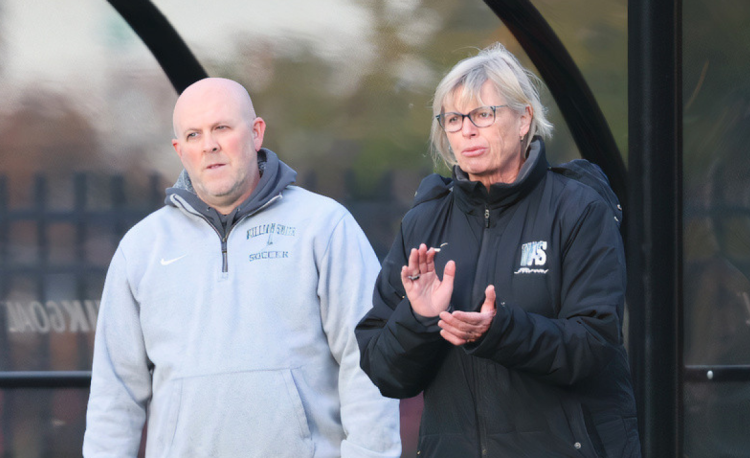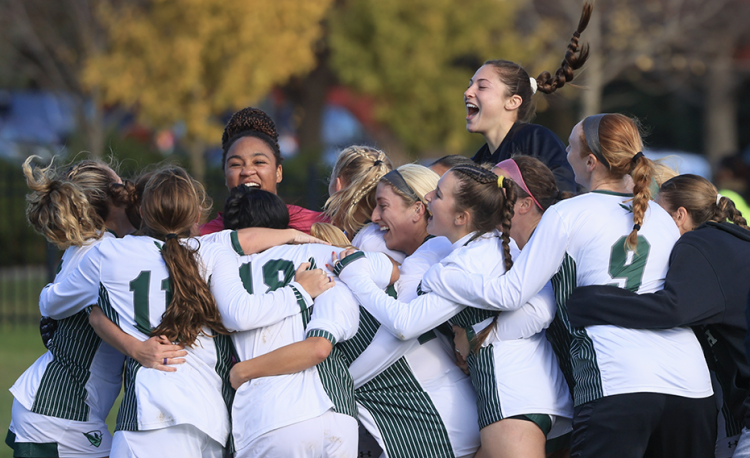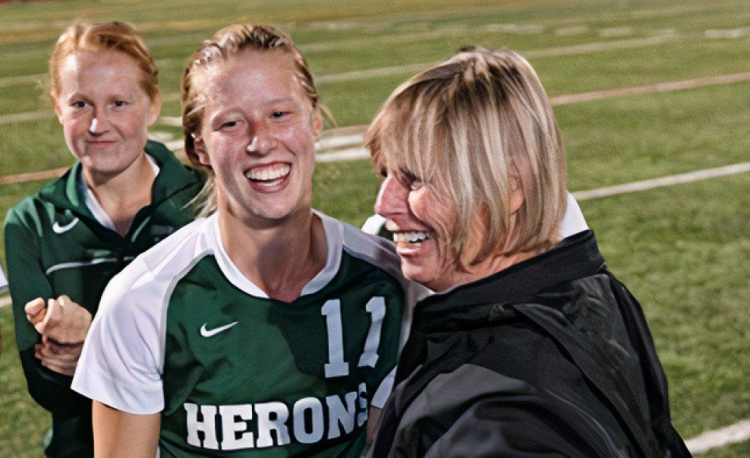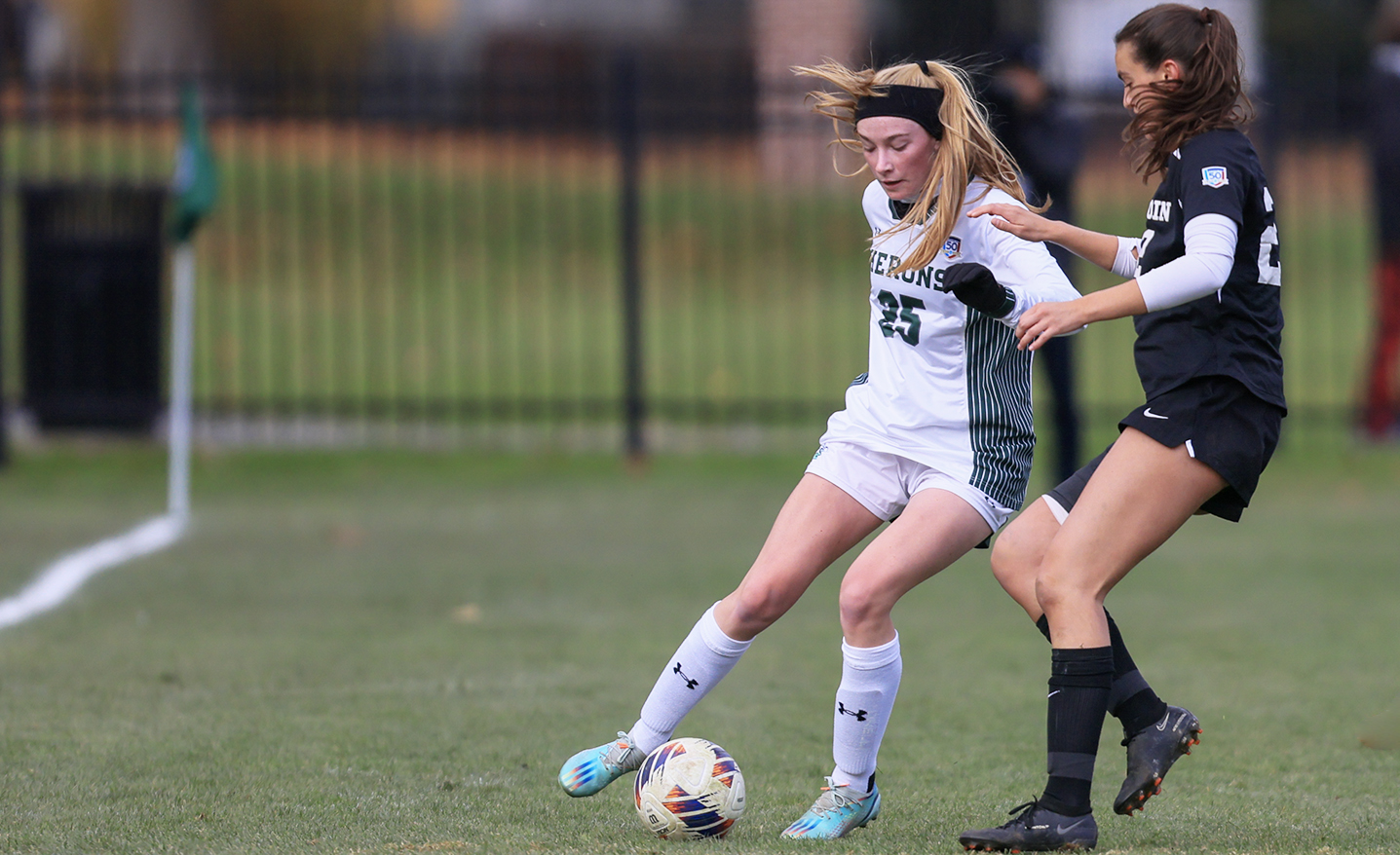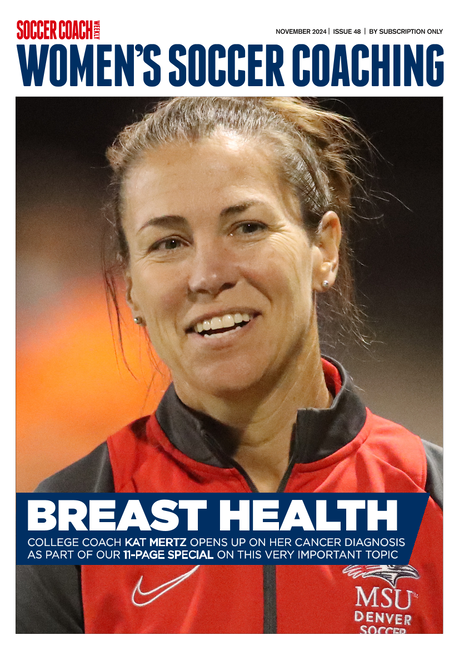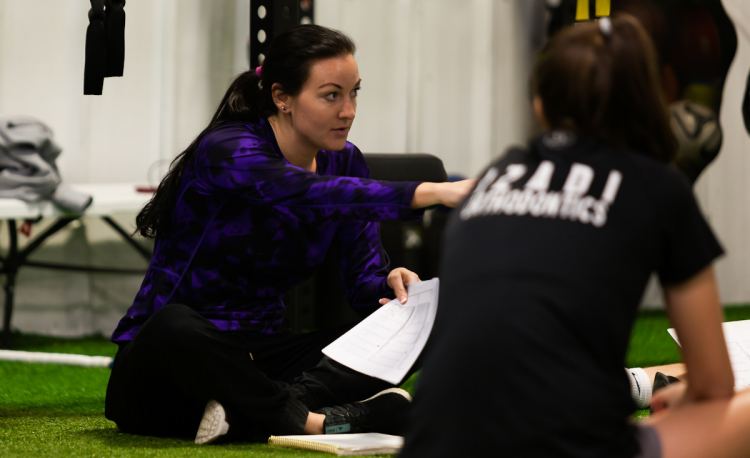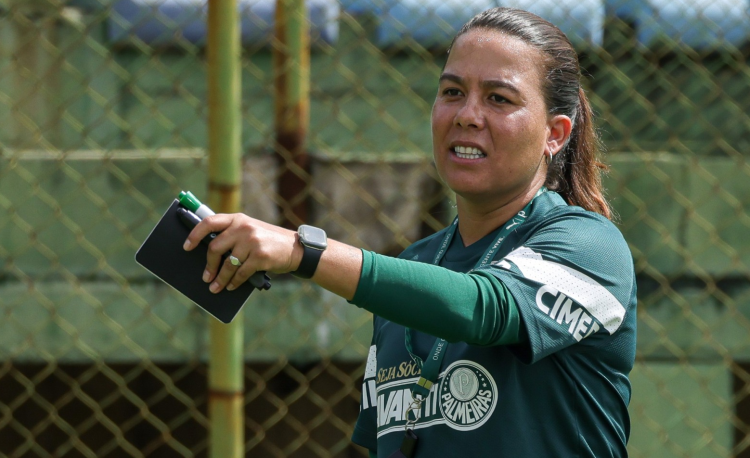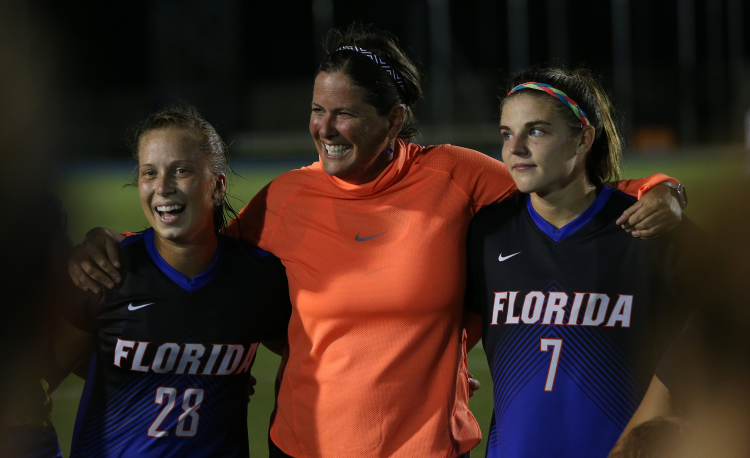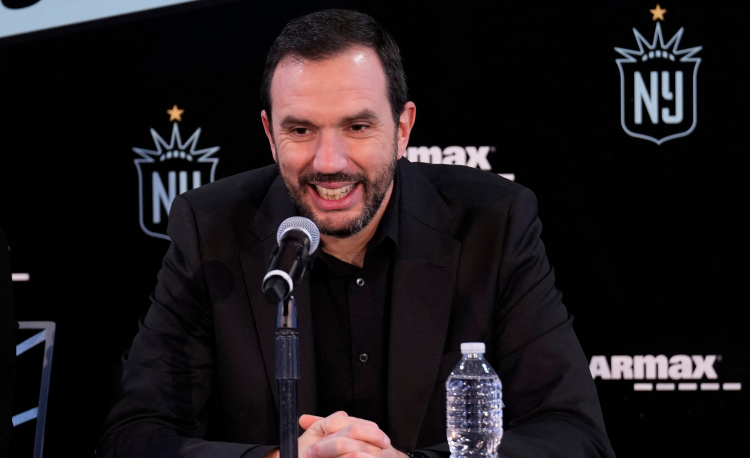You are viewing
1 of your 3 free articles
Aliceann Wilber: The history maker
In 1980, self-confessed soccer novice Alliceann Wilber became William Smith College’s first head coach – 44 years, 640 wins and two national titles later, she is a Hall of Famer who tells Carrie Dunn she still loves her job.
“The one thing I never wanted to do was coach.”
That’s a statement you wouldn’t expect to hear from one of the most successful college soccer coaches of all time.
Aliceann Wilber, the only head coach William Smith College has ever known, is the first woman in college soccer history to lead her team to 600 career victories.
In fact, she is second only to fellow college coaching legend Anson Dorrance in the list of match wins – 640 to his 934.
It is no wonder that she has been inducted into the United Soccer Coaches Hall of Fame, an accolade she received in 2019.
As she reflects on her career, though, she reveals that coaching soccer was never her childhood dream.
Indeed, growing up before Title IX sex-equality legislation guaranteed equal funding for men’s and women’s sports in education settings, her sporting hopes veered towards figure skating, or maybe track and field.
Growing up on a farm, and trying to overcome her shyness, gym class at school was the place she felt most comfortable.
“As a coach, I love training,” she told Women’s Soccer Coaching. “I love practising and getting things done.
“At some point late in my career, I realized, ‘Oh, now I understand why!’. Because, as a youngster, that’s what I did. I practised.”
After Wilber graduated from college in 1974, her ambition was to teach physical education to elementary school children.
“I coached soccer but I didn’t know anything – so I learned by the mistakes I made...”
She found a job at a small school in a remote area and was tasked with starting a sports program. She had good knowledge of a few sports – soccer was not one of them.
“I coached volleyball. I knew something about that because I’d been an athletic trainer as a student for a very good volleyball team at my college.
“I coached track and field and basketball. I coached soccer, but I didn’t know anything, so I learned by the mistakes I made.”
Wilber began to love soccer more and more. When she returned home to help her mother on the farm during summer vacations, she would play in pick-up soccer matches after work, where all the other players were male.
Her career path took a turn during a leave of absence from teaching, while she studied for her Masters degree in order to stay certified. A part-time position opened up at William Smith, in Geneva, New York, to start the women’s soccer program.
That was in 1980 – and Wilber has been there ever since.
She soon realised that, while her teaching background had helped her in a school sport environment, collegiate soccer was a step up.
Wilber admits now that this was a huge learning curve – not just for her, but for the college and the students.
“There was nothing. There had been a club, but it was non-existent, really. When we started here, not only was I ignorant of a lot about soccer – technique, tactics – but of the young women I had to train, many of them had never played soccer either. So we were this blank canvas.”
Since then, Wilber has led William Smith to two NCAA Division III titles, in 1988 and 2013, and 18 Liberty League championships.
She has also picked up individual accolades, United Soccer Coaches’ National Coach of the Year in 1987, 1988, 1991, 2008, and 2013.
William Smith was created as a women’s college, although it is co-educational now, and Wilber thinks that its founding principles still hold true today – one of the reasons she has enjoyed such a long career there.
“It was founded on supporting and empowering female students,” she says. “Working in an environment where there’s very specific support for the female students here, and those who work with them, has, I think, been a big factor in my longevity.
“I love to teach, I love working with young people and I just love having the opportunity to help shape their lives and their futures, over the course of four years and beyond.”
One of the most fascinating characteristics that Wilber identifies in herself is her love of change, which she says has been crucial to her success.
She points out that she had to change very quickly when she took the job as William Smith head coach because she simply did not have the skills and knowledge required to do well in the job.
“Necessity drove my focus on changing and learning,” she says, adding that it took several years before she began putting together the statistics that look so impressive in the record books today.
“The game is always evolving and so I’m fortunate in that sense, that there’s a skeleton, a structure, that is about change, and so it keeps it interesting.
“Soccer is such an intelligent game, and that’s fun, too, and I think change is important for anybody in something that they’re sustaining.”
Looking back over her own coaching career, Wilber is insightful when it comes to identifying what she has learned and how she has learned it. Of course, as with any successful coach, she would not change a thing.
“I think it’s the same for almost all young coaches. We start out coaching and we are very, very aware of how much we don’t know, which then leads to being insecure a little bit,” she reflects.
“I think some of your decisions and your emotional control is driven by the insecurity that comes with being young or taking things more personally.”
This applies outside coaching too; she gives the example of a player who might decide to leave their program because they didn’t get what they wanted right away. It is age and experience that gives you the ability to think through a situation.
“As an older coach, I think I’ve become much more level-headed,” she says. “I’ve seen more, done more stuff; it doesn’t faze me as much as the young, inexperienced, more insecure coach that I was then.”
THE BATTLE TO CONVINCE PLAYERS OF THE BENEFITS OF PROPER REST
Related Files
Aliceann urges coaches to stay informed when it comes to sports performance research, from diet and nutrition to proper rest.
She has embedded this desire for knowledge in the William Smith set-up, with great support from the college – pointing out that she had been promoting the importance of sleep long before it became a hot topic.
Wilber wryly notes that it had been harder to convince some of her players about the benefits of quality sleep than it had been to get them to avoid drinking alcohol during the season.
“You’ve got some kids who are really committed and will be willing to give up some of the college rites and ways of living, but that was an easier move in this program than it was to have them acquiesce and focus on eight to nine hours of sleep regularly.”
And Wilber says that anyone who wants their team to succeed should be looking to stay ahead of the knowledge curve.
“We can talk about growth mindsets and all the trendy terms, but if you want to be successful in competition, you’ve got to figure out things before the next person does. That’s just the nature of sport.”
‘WE DON’T WANT TO PLAY AMERICAN SOCCER, WE WANT TO PLAY EUROPEAN SOCCER!’ – HOW A TRIP TO SPAIN CHANGED MINDSETS
Despite being in the same job for more than four decades, Aliceann is already planning for future seasons.
Her defining principle has usually been to build a solid defence and progress from there, but taking her squad on a trip to Europe and training with the Real Betis players has given them all a new perspective.
The speed of the Spanish squad’s thought and movement inspired fresh ideas and approaches.
“My girls said, ‘We don’t want to play American soccer anymore – we want to play European soccer!’” she laughs.
“Going forward, I want a real cut and thrust mentality. If we score one goal, where’s the next one?”
She hopes that will help take the team at least to within touching distance of another NCAA championship game.
“We always want to win another national title,” she said. “We’ve won two, we’ve been in the final four, we’ve been finalists several other times.
“That’s always my goal: to create a season where our kids have the opportunity to experience how special the final four is.
“If we can just get there then we’ll worry about can we win it – but let’s get to the final four first, because it’s so hard to do.”
Wilber says it took her several years to really settle into her role, understand her process and philosophies and feel confident in her coaching, a process she thinks every coach has to go through.
She points to 1988 as her real turning point, when she took her team to the national finals; before that, she says, she was a more naïve coach, too reliant on emotions and instinct because she did not have the reserves of experience and knowledge to draw upon.
So, would the young, inexperienced, more insecure Wilber listen to the advice of her older self?
“Probably not”, she conceded. “I’d have to learn all that. I think you have to have the experience to learn it.
“Some things you can’t control. Kids are going to make decisions – the age group that I work with, or even younger – based on how they feel at the time.
“They don’t have enough experience to say, ‘Oh, I did that before and it didn’t work out so well, so I won’t jump the gun so quickly’. They just decide based on how they feel because that’s all they know. You’ve just got to let them go.”
Over the last 44 years – the duration of Wilber’s spell at William Smith – women’s soccer has grown in profile. She has seen many changes in the sport, boosted by the success of the US women’s national team.
“It seems like the girls really gravitate towards their role models. [It’s] not just about inspiring them to train but inspiring them in who they want to be as young women.
“For me, giving back to something that’s given you a lot is part of the expectation...”
“I think that’s really grown with soccer being as prevalent as it is, [especially] with the success in this country; it has maybe a bigger impact here than some of the other women’s sports.
“In the course of my career, girls have become way more technically proficient and can have more exposure to higher levels of competition.
“That, combined with the opportunities to have better quality of training earlier, has only helped the rise of popularity of soccer for female soccer in this country.”
Wilber feels strongly about encouraging the next generation of female coaches in women’s soccer at all levels, and encourages her players to consider taking on that kind of role after graduation.
“They’re 22 when they leave here and have had a long incline of infusion of other people’s help: their parents, their previous coaches.
“As they conclude their college career, how do they give back? For me, giving back to something that’s given you a lot is part of the expectation.
“I don’t care if it’s coaching college – it could be three-year-olds. Just find a way to help others to have the similar kind of opportunities that someone has helped you with.
“Pay it forward. Give back to others and get them started on a career where they start to feel good about themselves and their opportunities and develop some of those other, deeper character skills.”
Newsletter Sign Up
Newsletter Sign Up
Discover the simple way to become a more effective, more successful soccer coach
In a recent survey 89% of subscribers said Women's Soccer Coaching makes them more confident, 91% said Women's Soccer Coaching makes them a more effective coach and 93% said Women's Soccer Coaching makes them more inspired.
*includes 3 coaching manuals
Get Inspired
All the latest techniques and approaches
Women's Soccer Coaching offers proven and easy to use soccer drills, coaching sessions, practice plans, small-sided games, warm-ups, training tips and advice.
We've been at the cutting edge of soccer coaching since we launched Soccer Coach Weekly in 2007, creating resources for the grassroots youth coach, following best practice from around the world and insights from the professional game.
